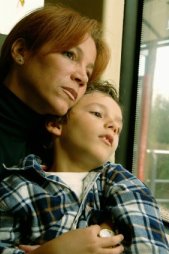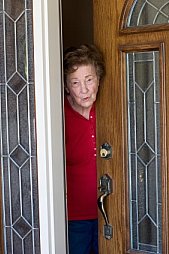Child Safety Tips:
Safeguarding Children
from Molesters

One of the many aspects of child safety is safeguarding your children from clever molesters.
SEXUAL INNOCENCE and CURIOSITY"Give me a kid who knows nothing about sex, and you've given me my next victim," said one child molester to a prison counselor. Pedophiles count on a child's sexual ignorance and curiosity.
Afraid to “burst the bubble” of their child’s innocence, most parents don’t fully discuss sex crimes with their children, though kids more easily accept these harsh realities than parents do. The safest children are those able to confide in their parents and openly discuss sexual matters without fear of reproach.
Allow – in fact, encourage – a child to say “NO” to unwanted affection from anyone. Don’t force children to kiss anyone if they’d rather not – or to be hugged, touched, or tickled by anyone against their will. A firm but respectful “NO” is not rude. Empower children to control what happens to them in so personal a way.
Teach your child that bad touch is being touched
anywhere that a bathing suit would cover, or touching anyone else there.
Their response should be, “Stop or I’ll tell.” and to always tell you
of any incident anyway.
Always believe your children, even if it concerns a trusted friend or relative. Too many kids endure long-term molestation because they thought they would "get in trouble" for resisting or telling you.
Stay attuned to what your child may be trying to tell you while hesitant, troubled, or otherwise reluctant. Show no emotion if a child tells you of molestation. Even a wild, fantastical tale may be a veiled revelation of something very troubling. Welcome open communication to encourage immediate reporting. Believe your child!
Watch for early warning signs. Look for unusual behavior or abrupt changes such as alienation, anxiety, depression, seemingly irrational fear of anyone, tantrums, sleep disturbances and bedwetting, sudden sexual interests, digestive problems, and difficulty walking or sitting.
Ask gently probing questions. Thoroughly investigate any suspicions. Try to find a balance between wild-eyed paranoia and blind denial of reality. For guidance, contact the experts at ChildHelp.org.
CHILD SAFETY TIPS for SLEEPOVERS
A 38-year-old Las Vegas father is accused of sexually assaulting one of his daughter's friends during a sleepover. Here's how to make sleepovers safe:
• Know the parents of your kid's friends. Otherwise, don't let your kids sleep over.
• Tell your kids they can come home for
any reason at any time during the night. Let them know you're willing to pick them
up – and let the other parents know that.
• Talk with
them when you drop off your child. The next day ask them about what happened at the sleepover.
Sarasota FL investigators found the body of 11-year-old Carlie Brucia - last seen
leaving a friend's home after a sleepover, headed for her home about a
mile away. Her friend's mother said Carlie wanted to walk home and said
she had permission from her mother. A few minutes after the girl left,
she called Carlie's house to check, and found out that Carlie did not have permission...

What about child safety in the home where your child is to spend the night – or visit from time to time? Are all family members and guests nonviolent? Are drugs or alcohol abused or kept around unlocked? Are there any dangerous pets? Do they have smoke alarms, online child filtering software, keep firearms fully secured, and observe the safety precautions of Home Security? If you don’t know, find out. Also know all the details of any excursion your child will go on.
Be aware of anyone who spends time alone with your child. Ask your child what they did and who they were with. Watch for evasive answers and behavior. If they're evasive, dig a little deeper.
Safety Tips for Kids
BABYSITTERS and NANNIES
Babysitting agencies rarely screen sitters fully for criminal histories, and being “bonded” is merely a form of monetary insurance that does nothing to protect your child.
Begin searching for a babysitter by asking family, friends, neighbors, at your church and local high schools. But merely hearing that:a babysitter is good isn't good enough. Perhaps have a neighbor girl learn:
►Red Cross Babysitting & Child Care Training
►Safe Sitter
►Child Care Aware
Interview extensively and check out references from past
employers and teachers. Have your child at the interview to see if your
child likes the sitter.
Have the babysitter arrive at your home a half-hour early to review your written ground rules such as: keeping all outside doors locked, no guests, no leaving, watching the children carefully, and all the Home Security precautions. (Also see Guidelines for Your Children’s (and Babysitter’s) Home Alone Behavior described in Molesters.) Leave written contact information to reach you (as well as emergency contact information described in A Parent’s Checklist – Indoors at Recap).
Take the babysitter through your home to make sure all doors and windows are locked and that she knows where the phone, emergency information, and first-aid supplies are located. With babysitter and children present, discuss the rules for television, telephone, computer, playing outdoors (where and with whom), eating and sleeping schedules. Even then, ask a neighbor to keep an eye on your house when entrusted to a babysitter.
Any outdoor outing must be with your prior OK, and then the sitter must follow the guidelines described in Parent's Checklist - Outdoors at Child - Outdoor Safety.
Upon returning home, ask the sitter what happened while you were away. Make sure the sitter gets home safely. Ask your children later if anything unusual happened or made them feel uncomfortable. Were there any telephone calls or visitors?
On the flip-side, to protect your child when s/he is the babysitter (or in any situation) have a clever code-word ready to alert you to danger. They can mention that during a phone call to signal you to come help them.
DAYCARE CENTERS and HOME-BASED BABYSITTERS
Has all the daycare center staff (or all visitors to your babysitter’s home) been screened for criminal histories? Do they have strict access control at all times (locked doors and visitor screening)? Do they welcome a parent's surprise visit at any time? Is it properly licensed and regulated by the government? Who is allowed to assist children in the lavatory? Do the stalls have half-doors to give a child some space yet still allow an adult to supervise? Are any employees, drivers, cleaners, or visitors allowed solitary access to a child – especially during naptime? Do they comply with the legal staff/child ratio when you visit unexpectedly? Exactly how do they discipline children? Begin the process of finding out about their child safety policies by contacting www.ChildCareAware.org.
Always carefully monitor your child’s feelings toward a babysitter, daycare center, school, youth group or program – and make sure they use the “U.S. Department of Justice Guidelines for the Screening of Persons Working with Children” by project director Noy S. Davis, Esq. April 1998.
Check your neighborhood:
See FamilyWatchdog.us for the registered sex offenders living near you. But since child molesters average 107 victims before their first arrest – many
won’t be on the maps yet. And some sex offenders may be homeless or
simply prowl outside their neighborhood, or – as 24 percent do
nationwide – disappear.
Also see:
Netsmartz
Kidsmartz
National Center for Missing and Exploited Children
Personal Safety Devices
• GPS Child Locator: a child tracking device. Many models are available. Use with the utmost parental discretion.
• Personal Security Alarm: (screamer or noisemaker). Attackers won’t likely chase a noisy target.
Crime-Safety-Security > Child Safety Overview > Safeguarding









